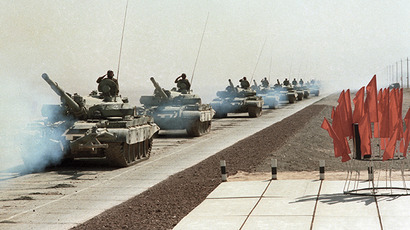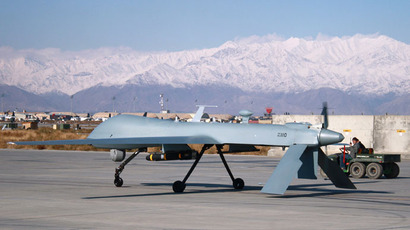Afghan marathon: US troops 'passing the baton to mercenaries' ahead of 2014 withdrawal
While Washington is pulling out its military might from Afghanistan next year, it is stepping up efforts to supply the war-torn state with plenty of military contractors, practically switching from national armed forces to mercenaries.
According to the latest census on contractors accompanying US
forces performed by the Professional Overseas Contractors industry
group, the US employs 110,404 people in Afghanistan, 33,444 of
which are Americans. Their job classifications include everything
from base support to construction and from logistics to
security.
“There are already far more contractors or mercenaries in
Afghanistan than there are [US] troops,” Middle East expert,
Phyllis Bennis told RT.
Once US troops withdraw, it will be up to this private military to
train the Afghan police and army. They will also take charge of the
development and reconstruction effort. All of this is stipulated in
the Afghan-American strategic partnership agreement which allows a
small number of US forces to remain in the country until 2024.
Under this strategic partnership agreement the remaining troops –
the number of which has not yet been made public – will remain
“until the future government in Afghanistan says that they
can’t,” Bennis says.
But since only a small number of US military personnel will stay,
these “would likely be mainly special forces” whose only job
“will be largely to kill Afghans, not to do anything else,”
Bennis believes.
“We don’t know either the final number, if that’s been agreed to
yet it’s being held privately, and we also don’t know the critical
question of whether the Afghan government will allow those US
troops to serve with immunity. That was the reason they were all
pulled out of Iraq,” she added.
The military troops however may have to leave all together if the
Afghan government refuses to grant them immunity, leaving US
soldiers prone to prosecution.
“The Obama administration was not prepared to have US troops who
might be accused of war crimes and might indeed be guilty of war
crimes be sent to trial in Iraqi courts,” Bennis explained.
“They may face the same decision in Afghanistan.”
In any case, experts agree, the US paid contractors will stay in
Afghanistan for many years to come.

According to casualty figures, contractors are also the primary targets of armed attacks by insurgents in the county. In 2011, at least 430 workers employed by American contractors lost their lives as the US began relying less on military enforcements and more on performance by way of private companies. By comparison, the US military reports that 418 of their own soldiers died that year.
With an estimated cost of some $627 billion in Afghanistan since 2001, that is some $50 billion a month, the US aims to reduce its military spending. However it will still pay for contractors to remain as long as the troop contingent stays for a decade.
The government spent $516 billion on contracts in 2012 all over the world, according to Bloomberg government study.
“Between 2001 and 2011, dollars obligated to contract awards by DOD
more than doubled, and contract spending outpaced growth in other
DOD outlays,” according to an analysis by the Center for
Strategic and International Studies which discovered DOD spent $375
billion on contracts in 2011.
For instance the USAID spent just $1.6 billion on contracts in 2000 – but in 2011 that number rose to $9 billion. The State Department $700 million in 2000 but was awarded $4 billion in 2011.
US government agencies do not disclose the funds they spend on contracts related to the war effort.
At the height of the US war in Iraq more than 150,000 contractors were employed there. Around 8,500 remain today, including 2,356 Americans.
“In Iraq, at its peak, we had at least as many, sometimes many more contractors as we did troops in battle areas,” Stephen Schooner, a professor of government contract law at George Washington University was quoted by the Fiscal Times.















